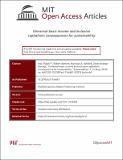Universal Basic Income and Inclusive Capitalism: Consequences for Sustainability
Author(s)
Hall, Ralph; Ashford, Nicholas A.; Ashford, Robert; Arango-Quiroga, Johan
Download107. Hall et al. UBI - sustainability-11-04481).pdf (1.569Mb)
Terms of use
Metadata
Show full item recordAbstract
Over the past forty years, income growth for the middle and lower classes has stagnated,
while the economy (and with it, economic inequality) has grown significantly. Early automation,
the decline of labor unions, changes in corporate taxation, the financialization and globalization
of the economy, deindustrialization in the U.S. and many OECD countries, and trade have
contributed to these trends. However, the transformative roles of more recent automation and
digital technologies/artificial intelligence (AI) are now considered by many as additional and
potentially more potent forces undermining the ability of workers to maintain their foothold in
the economy. These drivers of change are intensifying the extent to which advancing technology
imbedded in increasingly productive real capital is driving productivity. To compound the problem,
many solutions presented by industrialized nations to environmental problems rely on hyper-e cient
technologies, which if fully implemented, could further advance the displacement of well-paid job
opportunities for many. While there are numerous ways to address economic inequality, there is
growing interest in using some form of universal basic income (UBI) to enhance income and provide
economic stability. However, these approaches rarely consider the potential environmental impact
from the likely increase in aggregate demand for goods and services or consider ways to focus this
demand on more sustainable forms of consumption. Based on the premise that the problems of
income distribution and environmental sustainability must be addressed in an integrated and holistic
way, this paper considers how a range of approaches to financing a UBI system, and a complementary
market solution based on an ownership-broadening approach to inclusive capitalism, might advance
or undermine strategies to improve environmental sustainability.
Date issued
2019Publisher
Sustainability
Citation
Hall, R.P.; Ashford, R.; Ashford, N.A.; Arango-Quiroga, J. Universal Basic Income and Inclusive Capitalism: Consequences for Sustainability. Sustainability 2019, 11, 4481. https://doi.org/10.3390/su11164481
Collections
The following license files are associated with this item: